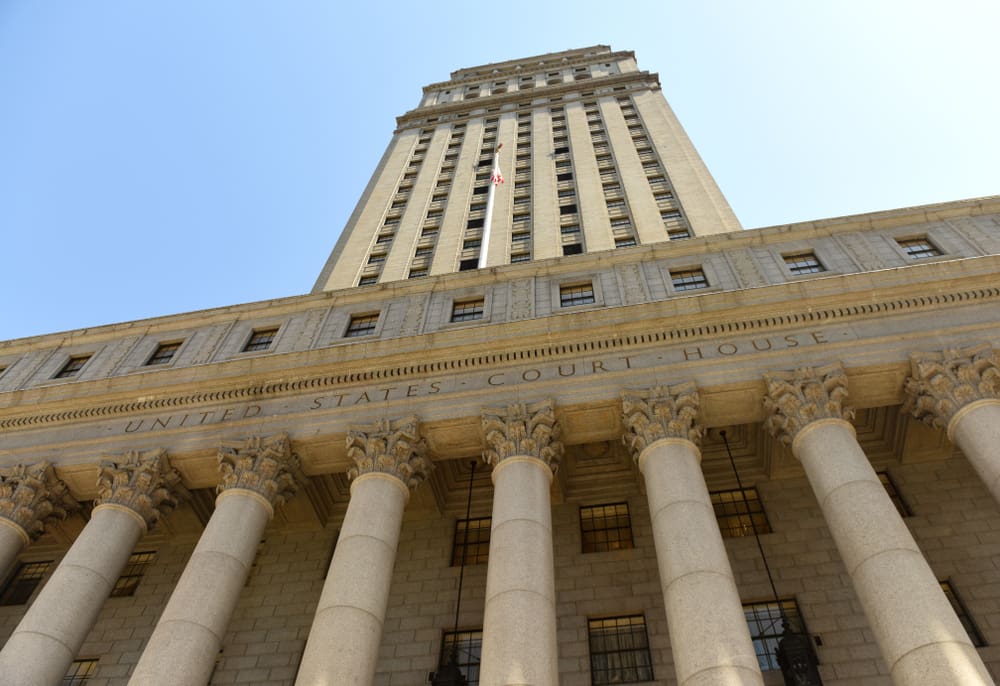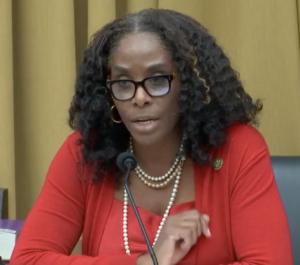
Congresswoman Stacey Plaskett remains the sole defendant in a lawsuit brought by Jeffrey Epstein victims against the V.I. government after a federal judge for the Southern District of New York ruled Friday that the court lacks personal jurisdiction over the other six officials named in the complaint.

However, Judge Arun Subramanian also noted in his 14-page order that if “any party wishes to move for transfer to another district in light of the Court’s decision, they should make the appropriate application to the Court within 14 days,” meaning the case could be revived in V.I. District Court.
Plaskett was travelling on Saturday and could not immediately be reached for comment, but she has previously strenuously denied the allegations in the suit and last July filed notice with the court that she would seek sanctions against Jordan K. Merson, the attorney representing the six Jane Does, saying the claims against her amount to “outright untruth, fiction, and misrepresentation.”
The class action suit was first filed in November 2023 by Jane Does 1-5, was amended that December to add a sixth plaintiff, and amended again last May.
A registered sex offender who pleaded guilty to procuring a minor for prostitution in Florida in 2008, Epstein died by apparent suicide in August 2019 at age 66 while in detention in New York on federal trafficking charges. His primary residence was Little St. James, his private island off St. Thomas where for years he ran a complex web of shell companies registered in the USVI — and afforded some $300 million in tax breaks through the territory’s Economic Development Commission — that enabled his crimes.
The complaint alleged negligence and violations of the Trafficking Victims Protection Act, or TVPA, and the Racketeer Influenced and Corrupt Organizations Act, or RICO, claiming territory officials actively conspired with Epstein to perpetuate his sex-trafficking scheme for their own gain.
However, Subramanian ruled Friday that the charges against former first lady and longtime Epstein office manager Cecile de Jongh are dismissed because she is protected by a broad release the plaintiffs signed when they settled a previous suit against Epstein, which bars all claims against any of his employees.
RICO claims are dismissed against the remaining defendants — the V.I. government, former governors John de Jongh and Kenneth Mapp, former senators Celestino White and Carlton Dowe, and former Attorney General Vincent Frazer — because merely receiving funds from Epstein’s New York bank account did not constitute transacting business in that state or subject them to personal jurisdiction by that state.
The New York court also lacks jurisdiction over the V.I. government, said Subramanian, writing that the plaintiffs’ 83-page second amended complaint alleging a $50 million loan from Epstein’s New York bank account — which the USVI has denied was ever solicited or made — “is not on its own sufficient for long-arm coverage” by the court over territory officials.
“The SAC includes no allegations that the alleged solicitation occurred in New York, or that Epstein was in New York when the USVI asked him for a loan. It says nothing about where the alleged terms of the loan were negotiated or whether there was a loan agreement,” Subramanian wrote in his order. “As with John de Jongh, Mapp, Frazer, and White, the only New York connection pleaded in the SAC is that the money Epstein allegedly loaned to the USVI in exchange for facilitating his sex trafficking came from a New York bank account.”
As for the 50 John Does named in the suit — variously identified as air traffic controllers, airport baggage check agents, police officers, and Coast Guard agents — “[e]ven assuming that these individuals were USVI employees, which the USVI strongly contests … none of these individuals is alleged to have had any New York contacts,” the judge said.
Plaskett, however, “is the only defendant that the [second amended complaint] alleges ever traveled to New York and the only defendant alleged to have actively solicited funds from Epstein in New York,” Subramanian wrote.
While he dismissed the RICO claims against Plaskett in her official capacity as “an alleged USVI employee,” he denied her motion to dismiss the Trafficking Victims Protection Act and negligence charges.
“Unlike John de Jongh, Mapp, White, Frazer, and the USVI, who are not alleged to have specifically desired New York money from New York bank accounts, the [second amended complaint] adequately pleads that Plaskett traveled to New York and met with Epstein in the hopes of accessing the New York donor market,” he said.
“In Plaskett’s case, the money she solicited from Epstein in New York and eventually received is directly related to the alleged quid pro quo to facilitate Epstein’s sex-trafficking enterprise,” so long-arm jurisdiction is established “at this stage,” the judge wrote.
While she does not live or work in New York, Plaskett has a home in Washington, D.C. and would not need to travel directly from the USVI, he said. Moreover, she is mentioned by name 60 times in the complaint and the plaintiffs assert that she engaged in unique conduct (like traveling to New York to solicit donations) that other defendants did not, he said.
While Plaskett had made brief, generalized arguments for dismissal of each of plaintiffs’ three claims against her under the Trafficking Victims Protection Act, saying that plaintiffs have “offer[ed] only . . . conclusory allegations” without any “well-pleaded fact[s]” in support, Subramanian differed in his assessment.
The second amended complaint, or SAC, “alleges that Plaskett received a position at a law firm affiliated with Epstein’s lawyer, Kellerhals, Ferguson, and Kroblin, that Epstein made the maximum contributions to her campaigns, that Epstein hosted a fundraiser for her, and that Epstein gave her a $30,000 loan,” he said.
In exchange, the complaint alleges that Plaskett approved over $300 million in tax breaks for Epstein’s companies when she was counsel for the V.I. Economic Development Commission — a benefit she has repeatedly denied having any role in deciding — and used her political influence as a congresswoman to ensure that Epstein’s clients, co-conspirators, and co-defendants travelled freely and had access to victims and plaintiffs. She also allegedly “agreed to be Epstein’s ‘friend,’” and knew that her actions were in service of Epstein’s sex-trafficking scheme, it says.
“These allegations have not been tested against the evidence, and the Court credits them solely for the purposes of evaluating the motion to dismiss. But at this stage, the SAC adequately pleads a violation of” the Trafficking Victims Protection Act, according to the judge.
He also denied her calls to dismiss the TVPA counts based on the 10-year statute of limitations, because some of the allegations occurred within the limitation period, and up to 2019, thus preserving the claim “based on all acts that were part of a single pattern.”
While Plaskett also sought to dismiss the complaint’s negligence claim, based on a two-year statute of limitations and because she had no duty to the plaintiffs based on her alleged lack of authority over customs, Coast Guard, air traffic control and police officials in the V.I., she “owed the plaintiffs an ‘ordinary duty of reasonable care,” Subramanian wrote.
The complaint adequately alleges that Plaskett helped facilitate Epstein’s sex-trafficking venture and a “fleeting, one-sentence argument that plaintiffs ‘fail to allege any injury within the two-year statute of limitations for negligence’ is insufficient to raise an issue,” he said, adding that she “may file a renewed application for dismissal of that claim, hopefully devoting more than a sentence to the issue.”


